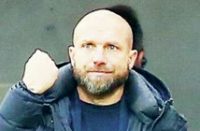SO you thought Gareth Bale was expensive? Well, when Aitor Kar-anka joined Real Madrid in 1997, he cost Los Blancos a thousand million.
Admittedly, that was pesetas, and roughly equivalent to about three million quid. But for a 24-year-old who'd only ever played a stone's throw from home, it was just as nerve-racking as the Welshman's record-breaking transfer fee of £85m.
Back then, there were no Galacticos, but there were Ferrari Boys, the name given to the quartet of Davor Suker, Predrag Mijatovic, Christian Panucci and Clarence Seedorf in reference to their love of fast cars and late nights.
Karanka, meanwhile, spent most of his spare time cooking, having enrolled on a college course alongside brother David. He was less Ferrari, more Volvo Estate.
“When I arrived as a player, it was the fifth season of the Ferraris,” said the former centre-half. “Madrid had just won La Liga. They had many famous players.
“When I landed in Madrid for the first time, I was scared. I went into the locker room with great respect. But then you realise that they are normal people and very good companions. They became good friends and together we had great success.” Of that there is no doubt. In five years at the Bernabeu, Karanka won a La Liga, two Spanish Cups, three Champions League titles, one Intercontinental and one European Super Cup.
Though he played just 130 games, he was part of the single most successful period in the club's modern-day history.
Listen to many Madrid fans and they'll tell you Karanka was carried, a replaceable cog in a machine powered by the likes of Fernando Redondo and, later, Luis Figo and Zinedine Zidane.
Certainly he is not remembered with the same affection as Fernando Hierro or Roberto Carlos, partners in that back four.
Egos
Yet with so many egos at work, it could easily be argued that without stolid, selfless sorts like Karanka, the whole thing would have flown off the rails.
The Madrid manager in that era Vicente Del Bosque once said that the true value of Karanka and Steve McManaman was that they held the dressing room together.
Jupp Heynckes, who won the 2013 Champions League with Bayern Munich, certainly knew his value. The German gave Karanka his debut for Athletic Bilbao in 1992, signed him for Madrid and then, in 2002, brought him back to Bilbao.
“When I went to Madrid in 1997, I said to the president that we needed a centre-back to win the European Cup,” said Heynckes. He asked who I wanted and I said: ‘Karanka'.
“He was the foundation of a renovated house, the cornerstone of my project. It was the same at Bilbao (in 2002). He brings a will to win, a professionalism, and a good atmosphere in the dressing room.”
Yet perhaps the most impressive aspect of his time at Madrid is the fact that Karanka missed an entire season with a heart condition and still fought back to win two European Cups.
Admitted to hospital after feeling ill in March 1998, he was diagnosed with myopericarditis, an inflammation of the heart muscle that left Karanka unable to exercise or even walk briskly for six months. Undiscovered, it could have killed him. “After that,” he said. “I was just happy to be alive.”
He eventually retired in 2006 after a brief stint at MLS side Colorado Rapids, coaching the Spanish U15 and U16 sides before returning to Madrid as assistant to Jose Mourinho in 2010.
“When you're a player, it looks so difficult to coach,” he said. “It was Fernando Hierro who convinced me to do it. And now I appreciate it, because I enjoy it so much.”
Karanka took plenty of stick at Madrid. Mourinho's hostility to the Spanish press meant his assistant was regularly sent to face the music, leading to accusations that he was little more than a puppet.
But it was an experience that convinced Karanka that he was ready for management and when Middlesbrough sacked Tony Mowbray last month, the Spaniard applied for – and won – the job.
Now, of course, he must work with players far less flash than Ferrari Boys or Galacticos, but that shouldn't bother Karanka. After all, this a manager who happily calls himself “the quiet one”.
AITOR KARANKA FACT FILE
Born: Vitoria, 1973 (Age 40)
Playing career: After starting out with Alaves, Karanka joined Athletic Bilbao, making his debut in 1993 under Jupp Heynckes. A regular in the first team for the next four years, the centre-back made 118 appearances for the Basque outfit but was unable to end a decade-long trophy drought.
A £3m switch to Real Madrid in 1997 saw Karanka clinch the La Liga title in his first season, although he missed the next with a heart complaint. Though never a regular at the Bernabeu, Karanka played 33 times in the Champions League and helped Madrid win the competition three times before returning to Bilbao in 2002.
Another four years with the Lions yielded successive UEFA Cup qualifications, and was followed in 2006 by a spell with MLS side Colorado Rapids. Karanka retired on his return from the US, aged 34.
He won one cap for Spain, a European Championship qualifier against Armenia in 1995, and also represented his country at the 1996 Olympics in Atlanta.
Managerial career: After retirement, Karanka was appointed Spanish U15 coach, subsequently taking charge of the U16s from 2008-2010.
Appointed assistant by Jose Mourinho on his arrival at Real Madrid in 2010, Karanka spent three years at the Portuguese manager's side, helping win the Spanish Cup and La Liga title in 2011-12.
Moved on by replacement Carlo Ancelotti, Karanka spent a spell out of the game before joining Middlesbrough as their new manager in November.

















